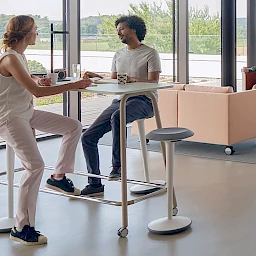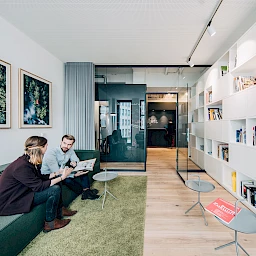The topic of leadership development is currently being rethought in many human resources departments. For John Deere, a producer of agricultural machinery, one aspect of this development is co-leadership — a form of leadership in which responsibility is purposely shared. What’s behind this concept, and how are companies implementing it in practice? We talked with Alina Reger, an organizational developer at the agricultural machinery producer John Deere, about the introduction of co-leadership at this company.
Ms Reger, how would you describe corporate culture at John Deere?
John Deere has a corporate history that goes back more than 180 years. This tradition has shaped us. Our corporate values — innovation, integrity, quality and commitment — are firmly established. Diversity, equity and inclusion (DEI) are also highly valued at John Deere. Our work culture is characterised by a very personal kind of interaction. We actively encourage each individual employee to look beyond the obvious, strike out in new directions, be innovative and communicate cross-functionally at work.
What opportunities are there at John Deere for people to continue their personal development and expand their skills?
John Deere has been honoured once again as one of Germany’s best employers. This positive evaluation is the result of the systematic implementation of the DEI strategy, among other things. John Deere recognises, respects and promotes the uniqueness of each individual employee and guarantees equal opportunities. Lifelong learning is highly valued at our company. In addition, our employees have many different opportunities to continue their personal and professional development. We define development according to the 70/20/10 model. According to this model, 70% of development comes from experience with the daily application of knowledge. Another 20% comes through learning from others. Here we offer opportunities such as spending “one day in your shoes”, mentoring and reverse mentoring programmes and exchange programmes such as the Lunch & Learn format. The remaining 10% is achieved through basic and advanced training. Here we offer in-house and external courses of instruction and training opportunities, as well as an AI-supported self-learning platform.
One of your concepts in the area of organizational development is co-leadership. How is co-leadership defined at John Deere?
By co-leadership we mean that two people share one leadership position and, most importantly, have equal rights. We call this pair of leaders a tandem. Through this model we’d like to offer our employees career opportunities that are oriented toward different phases of life and their individual needs. We also want to enable them to combine their careers and their families more effectively. In addition, with co-leadership we would naturally like to encourage, recruit and retain talented employees as an attractive employer. But co-leadership doesn’t replace a traditional full-time career. Instead, it’s an alternative career path that combines two perspectives. In practice, there is no single co-leadership model. Instead, there’s a wide variety of models, and the design of a model is ultimately an individual matter.
Where do the opportunities offered by such concepts lie?
In my opinion, the opportunities lie in the areas of leadership quality, team dynamics and corporate success. I believe that co-leadership contributes to a better combination of professional and family responsibilities and a better work-life balance. Managerial tasks can be distributed across four shoulders, and that results in an easing of burdens, greater satisfaction and a sense of well-being. Besides, co-leadership brings together two individuals who have different networks, experiences, expertise and strengths, and that reinforces the process of learning from and with one another. The teams also benefit from greater diversity, a double treasury of experience and the fact that a team member is accessible during sick leaves and vacations. Finally, co-leadership is an excellent tool for bringing in more diversity at the managerial level, promoting women and recruiting and retaining specialists through flexible working and leadership models. Besides, current studies demonstrate that leadership tandems are more innovative and creative than full-time managers.
What are the preconditions for a functioning model of part-time leadership and co-leadership?
One precondition is a culture that promotes diversity and flexibility — and support from top management, of course. It’s important to understand co-leadership as an equally valuable management model rather than an interruption of one’s career. The model also requires not only structural parameters for defining working times and content but also different degrees of freedom for individual implementation. And of course it also requires the interpersonal preconditions. A tandem can function only if the two members have similar values and a shared goal. The personal preconditions are also important. A co-lead must be able to work in a team and deal with conflict, make compromises and have a high level of self-reflection.
Please also read

What kind of experiences have you had with co-leadership at John Deere? What is going well, and what difficulties have to be mastered?
The idea of offering co-leadership as an alternative career path arose from a DEI initiative that was proposed by the Board of Directors. We then established the model in various departments and at various hierarchy levels about a year ago. Within the company, interest in co-leadership is running high. We want to build on that. Regular information events are attracting attention to this offer. People are reacting very positively to the fact that we provide our tandems with close support. Most importantly, we support the onboarding process, conduct regular retrospectives and also involve the team in the co-leadership process by means of a workshop where we talk about opportunities and expectations. The structural and organisational level is especially challenging. IT systems and standard software are designed in a 1:1 correlation. This is not the case with co-leadership. The way it’s represented in the organisation chart and the assignment of system rights etc. also require innovative solutions and approaches.
Which target groups does this offer address, and who actually takes advantage of it?
The offer is currently directed at managers in the non-tariff category. It is used by men and women at various levels of the hierarchy in various departments. And of course these individuals have a variety of reasons and motivations. For one thing, they want to combine their careers and families more effectively. But they also want to have time for continuing education or an intensive hobby or to make it easier to take the first step toward a managerial position.
How are the tandem partners brought together for co-leadership?
There are two possibilities. We never advertise positions solely for co-leadership. Instead, we offer co-leadership as an option. Interested employees either apply alone and indicate in their application forms that they have a personal interest in co-leadership. We then search for an appropriate tandem partner in the subsequent application process. Alternatively, there is already a tandem partner from the applicant’s personal network, and in that case both individuals apply for the position together. However, the matchmaking is still a point we want to simplify in the future.
Ms Reger, thank you for talking with us.
Please also read

Alina Reger is an organisational development consultant at John Deere. She is responsible for the implementation of co-leadership and supports tandems on their path of learning and development. John Deere, an internationally operating producer of agricultural machinery, was honoured as one of Germany’s best employers by the Top Employer Institute in 2023. The company operates six facilities in Germany. The company’s development, production and marketing centres offer employees needs-oriented parameters and a varied work environment. Further information is available at https://www.deere.com/en/.
Cover photo: Alina Reger





